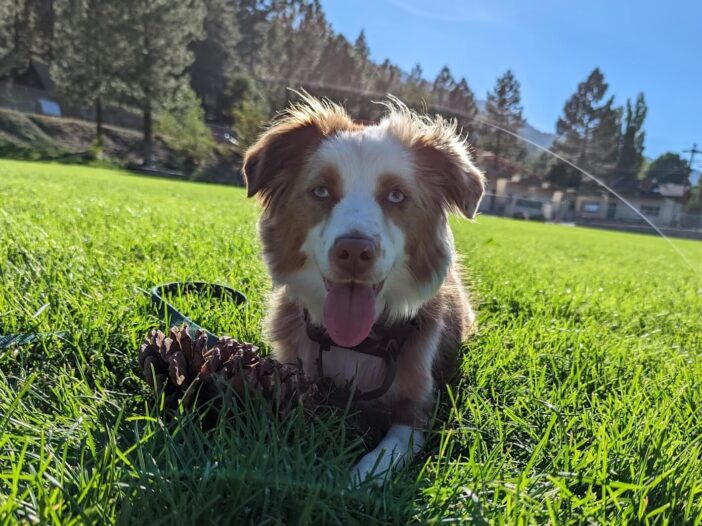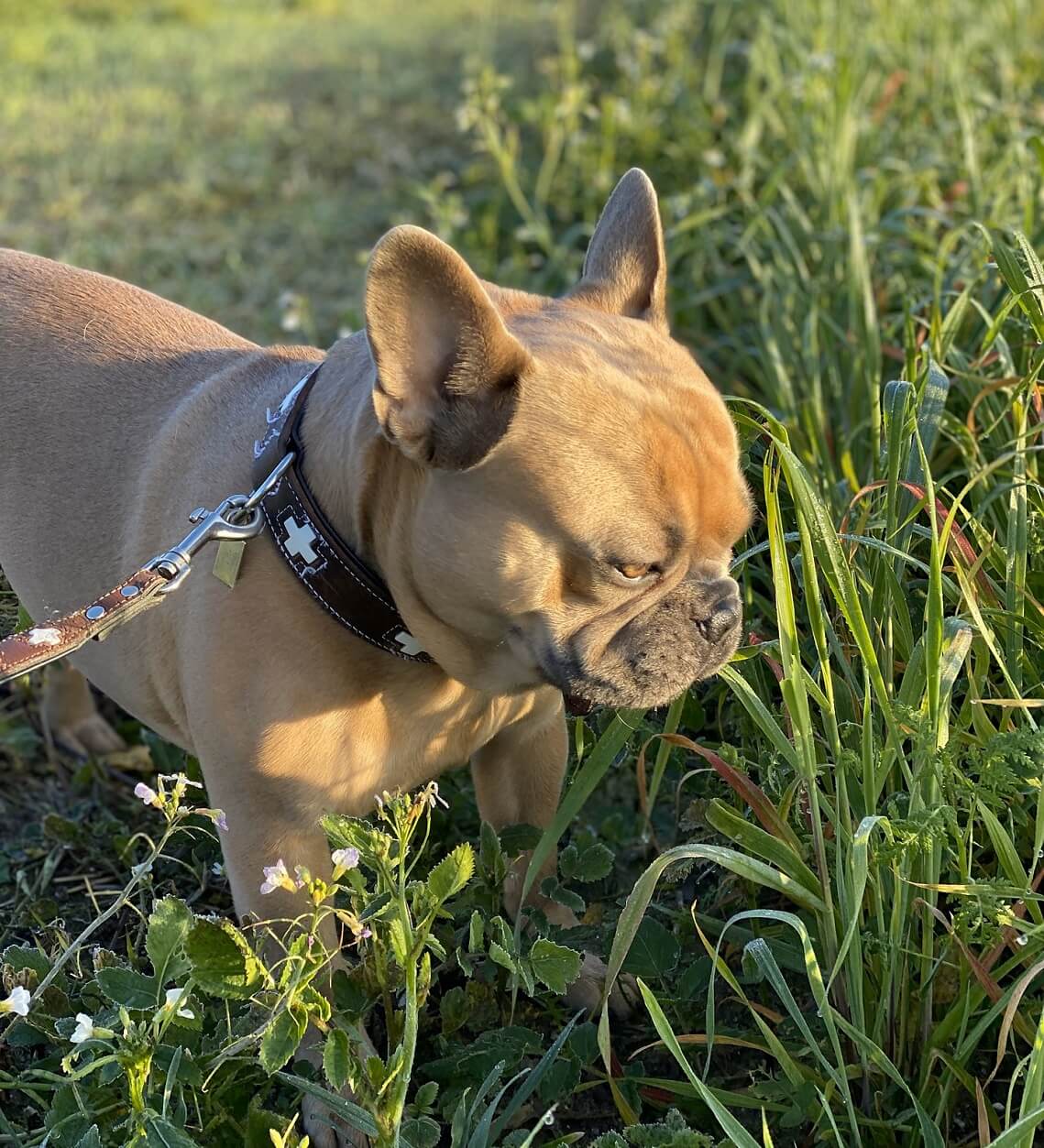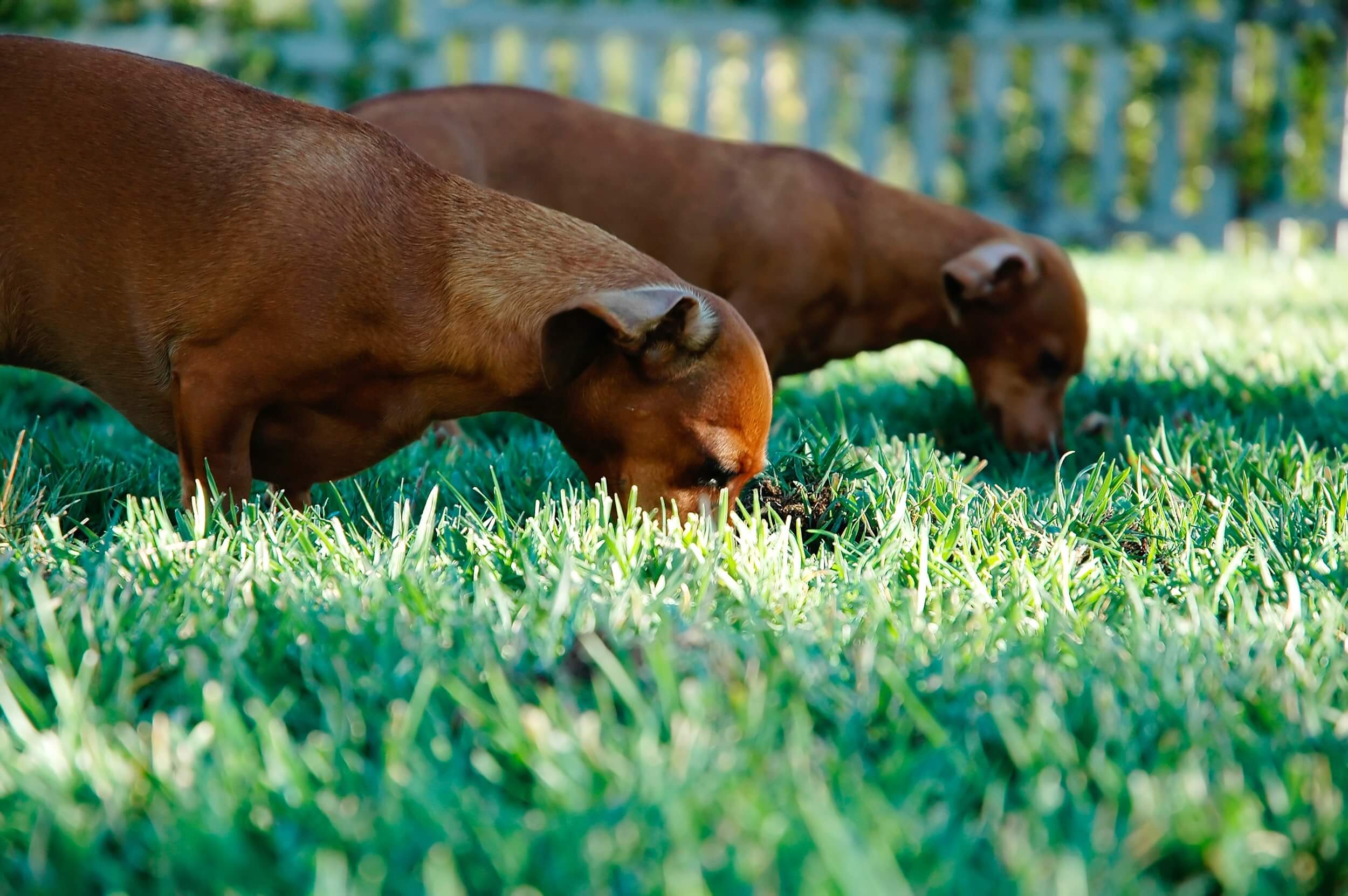
Why Do Dogs Eat Grass
Here is a jump-to-table of contents. In this article, I will discuss:
- Why Do Dogs Eat Grass
- How To Stop My Dog From Eating Grass
- Is My Dog Eating Grass Harmful Or Dangerous
- Why Do Dogs Eat Grass And Vomit
- Why Is My Dog Eating Grass All Of A Sudden
- What Types Of Grass Are Dangerous For A Dog?
- Unresearched Reasons Why Dogs Eat Grass
- Dog Parent Takeaways
Why Do Dogs Eat Grass?
It’s common to see a dog eating grass. Dogs eating grass straddles the line between dog behavior, dog nutrition, and dog biology. Luckily for you, I am a Certified Dog Behaviorist and Dog Nutritionist.
That’s relevant because Certified Dog Behaviorists and Nutritionists specialize in both reasons why a dog might eat grass. Your dog eats grass typically due to behavioral and/or nutritional factors. So let’s dig in.
TL;DR:
- Dogs eat grass because exploring the world through their mouth is normal behavior and part of the canine ethogram (and healthy as long as the grass is organic)
- It’s part of a dog’s genetics. Dogs are omnivores that scavenge, forage, and love carrion smells/tastes such as vile, pungent odors and stuff to play with and eat. Dogs eat lots of things with zero nutritional value for fun or because it seems interesting to them (like eating poop)
- The most effective way to get your dog to stop eating grass is management. However, there are many other methods and factors to consider that may help with grass-eating dogs, such as dog training, behavior modification, enrichment, exercise, and nutrition.
In a written survey of 47 pet parents, 79% of healthy dogs ate grass.
That includes grass and/or other plants.
Further, 68% of dogs ate grass regularly (daily or weekly) while other dogs ate grass once a month.
For example, while at my dog boot camp in Los Angeles, many dogs munch on grass, sticks, bark, leaves, and other organic matter.
Eating grass is very common.
Here are 9 reasons dogs eat grass, backed by science and experience.
Dogs Eat Grass Because:
- It’s FUN! Dogs explore the world through their mouths (and all other senses)
- It’s a displacement behavior (anxiety-reducing behavior, similar to how a person may tap their foot, twirl their hair, or bite their nails)
- A dog may have nutritional deficiencies
- It’s an attention-seeking behavior. If a dog is not getting enough attention (or dog training they will quickly figure out how to get your attention. If your dog needs more social interaction and attention from you, and eating grass gets your attention (even if you yell at your dog to stop! – which is attention), they will continue to eat grass to get attention.
- Dogs will enrich and entertain themselves. If a dog is under-enriched and trained (AKA bored), they will employ themselves, and we won’t always like what jobs they decide are fun.
- Grass tastes good
- Grass feels good on a dog’s tongue, mouth, teeth, and gums (just like people chew twigs, toothpicks, gum, etc.)
- Hunger – some research papers have discussed the time of day and how hungry your dog is as a reason for grass-eating. It stands to reason that satiety, the hungrier you are, the more desperate you become, and the more food sources you will eat for survival. However even though true, since we are not talking about starving dogs, pack animals, or free-roaming dogs or general canids, this is likely off the table as a reason for grass-eating dogs.
- Fiber – Dogs need fiber, and in this one research paper, scientists found that one dog, an altered male poodle, showed that his long-time grass-eating habits disappeared when the dog’s commercial food was changed to a higher fiber food.
How To Stop My Dog From Eating Grass
Most importantly, how to stop your dog from eating grass is just like all other behaviors, through dog training and management.
However, it will benefit you to get into the habit of asking what behaviors you want your dog to do instead of asking how to STOP a dog from eating grass.
What would you like your dog to do instead? Then practice that often with dog training. Which is what conditioning and learning are all about.
Here are some management and dog training techniques to practice so your dog stops eating grass and instead encourages them to pay attention to you and do other preferred behaviors instead.
- Dog training – Teach your dog any of the following dog behaviors that are incompatible with eating things off the ground, such as grass. Teach your dog a strong recall, to look at you, heel next to you as you walk/jog/run, leave it, drop it, stand, etc.
- Behavior Modification through exposure therapies such as differential reinforcement of incompatible/alternative behavior (DRA/DRI), etc. and D/CC
- Have your dog wear a head harness to give you extra control over your dog’s mouth and head
- Condition your dog to love wearing a muzzle. While grass, food, and water should be able to be accessed through ALL muzzles, it should help slow down a dog’s grass-eating behavior or give you time to get your dog’s attention when you see them going for grass.
- Management – All dog training requires an environment set up for you and your dog’s success. Keep your dog leashed. Don’t allow your dog outside off-leash or roaming around in your backyard unattended. Pay attention to your dog. Make sure you are feeding your dog complete and balanced high-quality dog food and food items that are healthy and ones that he loves. Here’s a list of dangerous dog foods to stay away from
Is My Dog Eating Grass Harmful Or Dangerous
Yes and no. As mentioned, there are a number of reasons why dogs eat grass and equally as many reasons not to want your dog to graze on grass.
The most dangerous part of a dog eating grass is the chemicals used to treat lawns, yards, and grass fields. Dangerous chemicals on the grass can kill your dog.
Don’t let your dog eat grass on any lawn that “looks perfect” or is chemically treated.
The same reason people eat organic fruits and vegetables is the same reason you want to stop your dog from eating grass that has been chemically treated (unfortunately, that is most grass you see in the Pacific Palisades, Beverly Hills, or anywhere in Los Angeles or your neighborhood)
Grass Eating Is Not:
- Dangerous for your dog. Your dog eats grass for many reasons, and it is not dangerous as long as the grass isn’t chemically treated.
- Necessarily Pica – Pica is eating non-edible foods, typically with insignificant or zero nutritional value. While grass is not complete and balanced, it has some nutritional value as a plan,t and hence what a dog absorbs in the gut from digesting grass is not moot. Pica is also typically associated with eating dangerous non-food items. Eating organic grass is not dangerous.
- Caused by atavistic qualities – Eating grass is not that much of an atavistic behavior. While wolves do eat grass and plants, it is not a large part of their diet or behavior.
- Because they are pack animals. Dogs are not pack animals, alpha, or wolves
- Because it’s a wild dog. What is a wild dog? Let’s assume wild canids include wolves, jackals, foxes, and coyotes. Of which, dogs Canis lupus familiaris are none. Also, dogs in the wild are very rare and non-existent in the United States, let alone in Los Angeles, California.
Inherited from a domesticated dog’s ancestors are scavenging and foraging behaviors that contribute to a dog’s opportunistic eating habits.
Because domesticated dogs are not wild dogs, any argument about domesticated dogs doesn’t include wild dogs (or wolves).
To elaborate on the argument comparing domesticated dogs to wild dogs, in actuality, community dogs and feral dogs are the closest you will get to “wild” dogs in the United States and most other countries.
Domesticated dogs are scavengers and foragers, not hunters. Hunting (killing prey to survive) has largely been bred out of dogs over the decades through domestication.
Dogs are opportunistic, and if they are able to and inclined to hunt other animals (most aren’t), they will usually eat a dead animal, not successfully kill a live one.
Yes, a dog might kill a squirrel, rat, or vermin on occasion, but it’s not a sustainable food source for a domesticated dog. Dogs were selectively bred for thousands of years for domestication. AKA to be dependent upon and to require people to survive.

Why Do Dogs Eat Grass And Vomit
As a vegan, I am happy to say that dogs are omnivores, scavengers, and foragers (even though taxonomically classified otherwise). They thrive on a balanced and complete diet, whether vegan, plant-based, or with meat and vegetables.
Yes, dogs can thrive on plant-based diets (balanced and complete) and explore the world through their mouths.
Dogs like to eat non-edible/nutritional items all the time (toys, poop, sticks, shoes, etc.)
From the same Internet survey of pet parents mentioned earlier, a smaller 22% of the dogs ate grass and vomited after ingestion.
Why dogs eat grass and throw up is likely a cause-and-effect scenario. Either the dog was already ill, ate too much, or the type of grass and/or chemicals or bacteria on the grass in the dog park caused vomiting.
However, there is no evidence that shows that dogs eat grass to induce vomiting. But rather, it’s a simple factor that they ate bad “food” (grass).
A dog will eat grass for many reasons, but if the grass is unhealthy or disagrees with their stomach, a dog may throw up. Just like when we eat food and occasionally get food poisoning, we vomit. But we don’t eat the food to cause vomiting.
Most of the grass a dog eats passes through the dog’s intestinal tract, undigested. You can see this by the Fecal Scoring Chart after your dog eats grass. While some blades of grass may exist (like corn in a human’s poop, yuk), not all of the grass contents are visible and or come out whole. This is not only due to the masticating effect of chewing the grass but also to a dog’s gastrointestinal tract digesting the grass and utilizing some of its nutrients.
Dogs have the ability to digest and thrive on carbohydrates.
The answers to the questions “Is it OK for dogs to eat grass?” and” Should I let my dog eat grass?” are yes.
It is OK and normal for your dog to eat grass.
Why Is My Dog Eating Grass All Of A Sudden
In this scenario, if my dog all of a sudden starts to eat grass, take note of the setting events, antecedents, your dog’s overall health, enrichment, training, and all of the other factors mentioned above about why dogs eat grass.
It’s likely something has changed in the dog’s diet, environment, and or routine that is either causing boredom, stress, interest, lack of training, enrichment, etc.
What Types Of Grass Are Dangerous For A Dog?
Grass species are all different. For perspective, there are around 12,000 different types of grass in the botanical family Poaceae.
Yes, 12,000!!
They are like all plants, specific to some environments based on weather, elevation, climate, etc. Whether you live in Los Angeles, the desert, by the beach, or in the mountains, your environment has certain types of grass.
Some dogs prefer one type of grass over others. (just like dog poop. Gross, I know!)
But fresh grass (also like poop) might be more desirable than long, mature grass. Green grass over browner grass, etc.
If your dog is eating a healthy, balanced, and complete diet and not throwing up after eating grass, there is nothing to worry about, and your dog can safely eat grass.
If your dog is eating a healthy, balanced, and complete diet and vomiting, either change the grass your dog has access to and/or change your dog’s food and experiment with other foods that have different fiber, vitamins, and nutritional content.
It’s also much healthier for a dog’s gut to have a variety of food sources (protein, carbs, vitamins, minerals, and nutrients) in their diet and not the same food most of their lives.

Unresearched Reasons Why Dogs Eat Grass
After studying dogs for 30 years and spending most of my career as an animal behaviorist and dog trainer, there’s still a lot we don’t know or understand about dogs.
Conjecture and anecdotal reasons you might read in the internet comment sections are that eating grass causes a dog to vomit. While this might be correlated, it does not prove causation or intention.
A dog who feels sick or has worms is not likely to eat grass to induce vomiting. Dogs don’t eat grass as an emetic behavior. Dogs don’t eat grass to vomit.
In a study where a gastrointestinal disturbance was induced in dogs to cause diarrhea, it was shown that dogs with mild diarrhea did not seek out grass-eating. Nor did they vomit after eating grass.
These dogs did not eat grass in order to throw up or elevate gastrointestinal illness.
Dog Parent Takeaways
Dogs run, drool, roll around in the dirt, and eat stuff we don’t want them to. That’s part of being a dog and typically not dangerous or harmful behaviors.
Teach your dog “Leave It”, a solid “Recall”, and or what you want them to eat or do instead of eating grass or performing any unwanted behavior.
If you’re having trouble with your dog’s behavior and want Certified Dog Behaviorist, Trainer, and Nutritionist Russell Hartstein to work with you and your dog, get started with our Dog Boot Camp in Los Angeles, CA, or hop on a Phone/ Video Call from anywhere in the world to get some immediate dog training help.

Thank you for this comprehensive article, Russell Hartstein. As a dog enthusiast, I’ve always been curious about why dogs engage in certain behaviors, such as eating grass. Your in-depth exploration of the topic, backed by your expertise as a Certified Dog Behaviorist and Dog Nutritionist, sheds light on the multi-faceted nature of this common behavior.
I appreciate how you’ve delved into the various reasons why dogs eat grass, addressing both behavioral and nutritional factors. Your breakdown of the different motivations, from exploring the world to seeking attention, nutritional deficiencies, and more, provides a holistic understanding of this intriguing habit. Furthermore, your emphasis on the importance of enrichment, training, and balanced nutrition to curb grass-eating behavior is invaluable for dog owners looking for effective solutions.
The information you’ve provided regarding the potential dangers of chemically treated grass and the role of grass in a dog’s diet is particularly enlightening. Your insights provide actionable steps to ensure the well-being of our furry companions, while dispelling myths and offering practical guidance.
This article is a valuable resource for dog owners like me who want to comprehend and address their pets’ behaviors from a well-informed perspective. Thank you for sharing your expertise and contributing to the betterment of our relationships with our beloved canine companions.
Warm regards,
[ DR-DOGS ]
Thank you for your kind words and I’m so happy you enjoyed the article. Russ